
The Project Gutenberg EBook of The Adventures of Tom Sawyer, Part 1. by Mark Twain (Samuel Clemens) This eBook is for the use of anyone anywhere at no cost and with almost no restrictions whatsoever. You may copy it, give it away or re-use it under the terms of the Project Gutenberg License included with this eBook or online at www.gutenberg.org Title: The Adventures of Tom Sawyer, Part 1. Author: Mark Twain (Samuel Clemens) Release Date: June 29, 2004 [EBook #7193] Language: English Character set encoding: ISO-8859-1 *** START OF THIS PROJECT GUTENBERG EBOOK TOM SAWYER, PART 1. *** Produced by David Widger





|
CHAPTER I. CHAPTER II.
CHAPTER III. |
Most of the adventures recorded in this book really occurred; one or two were experiences of my own, the rest those of boys who were schoolmates of mine. Huck Finn is drawn from life; Tom Sawyer also, but not from an individual—he is a combination of the characteristics of three boys whom I knew, and therefore belongs to the composite order of architecture.
The odd superstitions touched upon were all prevalent among children and slaves in the West at the period of this story—that is to say, thirty or forty years ago.
Although my book is intended mainly for the entertainment of boys and girls, I hope it will not be shunned by men and women on that account, for part of my plan has been to try to pleasantly remind adults of what they once were themselves, and of how they felt and thought and talked, and what queer enterprises they sometimes engaged in.
THE AUTHOR.
HARTFORD, 1876.
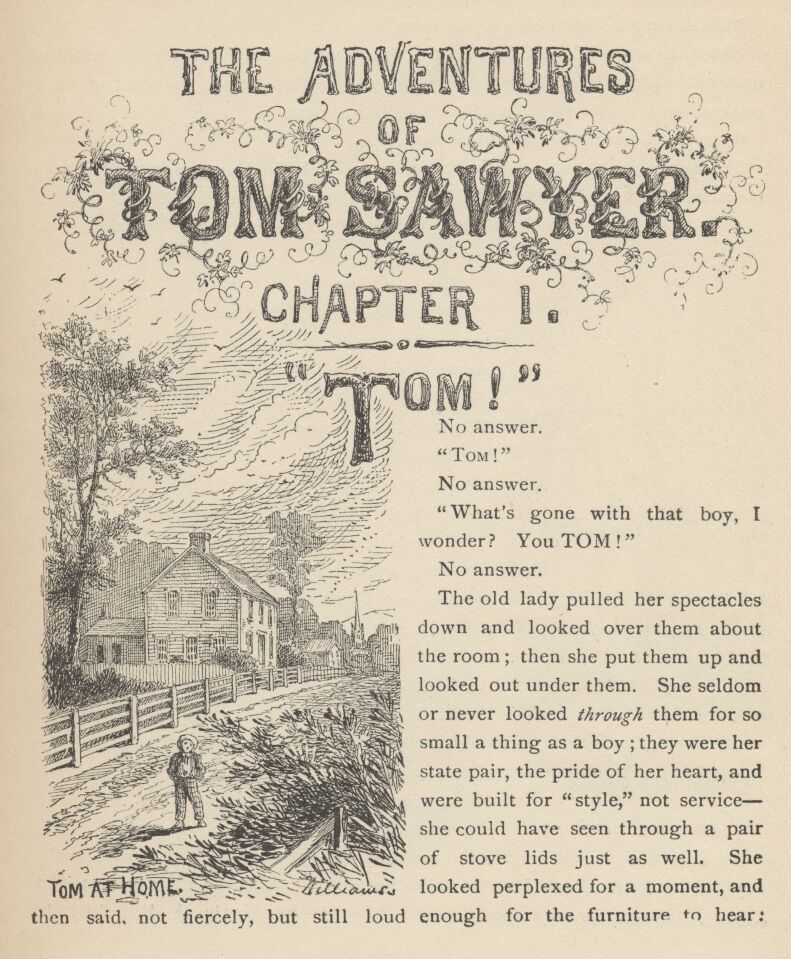
"TOM!"
No answer.
"TOM!"
No answer.
"What's gone with that boy, I wonder? You TOM!"
No answer.
The old lady pulled her spectacles down and looked over them about the room; then she put them up and looked out under them. She seldom or never looked THROUGH them for so small a thing as a boy; they were her state pair, the pride of her heart, and were built for "style," not service—she could have seen through a pair of stove-lids just as well. She looked perplexed for a moment, and then said, not fiercely, but still loud enough for the furniture to hear:
"Well, I lay if I get hold of you I'll—"
She did not finish, for by this time she was bending down and punching under the bed with the broom, and so she needed breath to punctuate the punches with. She resurrected nothing but the cat.
"I never did see the beat of that boy!"
She went to the open door and stood in it and looked out among the tomato vines and "jimpson" weeds that constituted the garden. No Tom. So she lifted up her voice at an angle calculated for distance and shouted:
"Y-o-u-u TOM!"
There was a slight noise behind her and she turned just in time to seize a small boy by the slack of his roundabout and arrest his flight.
"There! I might 'a' thought of that closet. What you been doing in there?"
"Nothing."
"Nothing! Look at your hands. And look at your mouth. What IS that truck?"
"I don't know, aunt."
"Well, I know. It's jam—that's what it is. Forty times I've said if you didn't let that jam alone I'd skin you. Hand me that switch."
The switch hovered in the air—the peril was desperate—
"My! Look behind you, aunt!"
The old lady whirled round, and snatched her skirts out of danger. The lad fled on the instant, scrambled up the high board-fence, and disappeared over it.
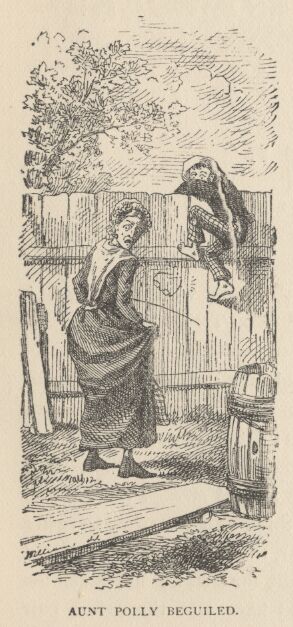
His aunt Polly stood surprised a moment, and then broke into a gentle laugh.
"Hang the boy, can't I never learn anything? Ain't he played me tricks enough like that for me to be looking out for him by this time? But old fools is the biggest fools there is. Can't learn an old dog new tricks, as the saying is. But my goodness, he never plays them alike, two days, and how is a body to know what's coming? He 'pears to know just how long he can torment me before I get my dander up, and he knows if he can make out to put me off for a minute or make me laugh, it's all down again and I can't hit him a lick. I ain't doing my duty by that boy, and that's the Lord's truth, goodness knows. Spare the rod and spile the child, as the Good Book says. I'm a laying up sin and suffering for us both, I know. He's full of the Old Scratch, but laws-a-me! he's my own dead sister's boy, poor thing, and I ain't got the heart to lash him, somehow. Every time I let him off, my conscience does hurt me so, and every time I hit him my old heart most breaks. Well-a-well, man that is born of woman is of few days and full of trouble, as the Scripture says, and I reckon it's so. He'll play hookey this evening, * and [* Southwestern for "afternoon"] I'll just be obleeged to make him work, tomorrow, to punish him. It's mighty hard to make him work Saturdays, when all the boys is having holiday, but he hates work more than he hates anything else, and I've GOT to do some of my duty by him, or I'll be the ruination of the child."
Tom did play hookey, and he had a very good time. He got back home barely in season to help Jim, the small colored boy, saw next-day's wood and split the kindlings before supper—at least he was there in time to tell his adventures to Jim while Jim did three-fourths of the work. Tom's younger brother (or rather half-brother) Sid was already through with his part of the work (picking up chips), for he was a quiet boy, and had no adventurous, trouble-some ways.
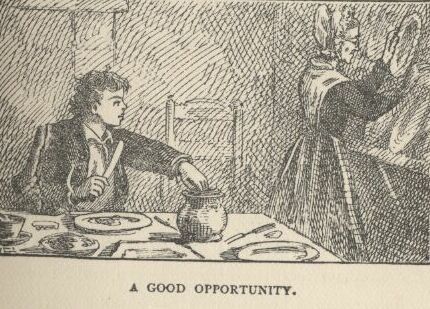
While Tom was eating his supper, and stealing sugar as opportunity offered, Aunt Polly asked him questions that were full of guile, and very deep—for she wanted to trap him into damaging revealments. Like many other simple-hearted souls, it was her pet vanity to believe she was endowed with a talent for dark and mysterious diplomacy, and she loved to contemplate her most transparent devices as marvels of low cunning. Said she:
"Tom, it was middling warm in school, warn't it?"
"Yes'm."
"Powerful warm, warn't it?"
"Yes'm."
"Didn't you want to go in a-swimming, Tom?"
A bit of a scare shot through Tom—a touch of uncomfortable suspicion. He searched Aunt Polly's face, but it told him nothing. So he said:
"No'm—well, not very much."
The old lady reached out her hand and felt Tom's shirt, and said:
"But you ain't too warm now, though." And it flattered her to reflect that she had discovered that the shirt was dry without anybody knowing that that was what she had in her mind. But in spite of her, Tom knew where the wind lay, now. So he forestalled what might be the next move:
"Some of us pumped on our heads—mine's damp yet. See?"
Aunt Polly was vexed to think she had overlooked that bit of circumstantial evidence, and missed a trick. Then she had a new inspiration:
"Tom, you didn't have to undo your shirt collar where I sewed it, to pump on your head, did you? Unbutton your jacket!"
The trouble vanished out of Tom's face. He opened his jacket. His shirt collar was securely sewed.
"Bother! Well, go 'long with you. I'd made sure you'd played hookey and been a-swimming. But I forgive ye, Tom. I reckon you're a kind of a singed cat, as the saying is—better'n you look. THIS time."
She was half sorry her sagacity had miscarried, and half glad that Tom had stumbled into obedient conduct for once.
But Sidney said:
"Well, now, if I didn't think you sewed his collar with white thread, but it's black."
"Why, I did sew it with white! Tom!"
But Tom did not wait for the rest. As he went out at the door he said:
"Siddy, I'll lick you for that."
In a safe place Tom examined two large needles which were thrust into the lapels of his jacket, and had thread bound about them—one needle carried white thread and the other black. He said:
"She'd never noticed if it hadn't been for Sid. Confound it! sometimes she sews it with white, and sometimes she sews it with black. I wish to gee-miny she'd stick to one or t'other—I can't keep the run of 'em. But I bet you I'll lam Sid for that. I'll learn him!"
He was not the Model Boy of the village. He knew the model boy very well though—and loathed him.
Within two minutes, or even less, he had forgotten all his troubles. Not because his troubles were one whit less heavy and bitter to him than a man's are to a man, but because a new and powerful interest bore them down and drove them out of his mind for the time—just as men's misfortunes are forgotten in the excitement of new enterprises. This new interest was a valued novelty in whistling, which he had just acquired from a negro, and he was suffering to practise it un-disturbed. It consisted in a peculiar bird-like turn, a sort of liquid warble, produced by touching the tongue to the roof of the mouth at short intervals in the midst of the music—the reader probably remembers how to do it, if he has ever been a boy. Diligence and attention soon gave him the knack of it, and he strode down the street with his mouth full of harmony and his soul full of gratitude. He felt much as an astronomer feels who has discovered a new planet—no doubt, as far as strong, deep, unalloyed pleasure is concerned, the advantage was with the boy, not the astronomer.
The summer evenings were long. It was not dark, yet. Presently Tom checked his whistle. A stranger was before him—a boy a shade larger than himself. A new-comer of any age or either sex was an im-pressive curiosity in the poor little shabby village of St. Petersburg. This boy was well dressed, too—well dressed on a week-day. This was simply as- tounding. His cap was a dainty thing, his close-buttoned blue cloth roundabout was new and natty, and so were his pantaloons. He had shoes on—and it was only Friday. He even wore a necktie, a bright bit of ribbon. He had a citified air about him that ate into Tom's vitals. The more Tom stared at the splendid marvel, the higher he turned up his nose at his finery and the shabbier and shabbier his own outfit seemed to him to grow. Neither boy spoke. If one moved, the other moved—but only sidewise, in a circle; they kept face to face and eye to eye all the time. Finally Tom said:
"I can lick you!"
"I'd like to see you try it."
"Well, I can do it."
"No you can't, either."
"Yes I can."
"No you can't."
"I can."
"You can't."
"Can!"
"Can't!"
An uncomfortable pause. Then Tom said:
"What's your name?"
"'Tisn't any of your business, maybe."
"Well I 'low I'll MAKE it my business."
"Well why don't you?"
"If you say much, I will."
"Much—much—MUCH. There now."
"Oh, you think you're mighty smart, DON'T you? I could lick you with one hand tied behind me, if I wanted to."
"Well why don't you DO it? You SAY you can do it."
"Well I WILL, if you fool with me."
"Oh yes—I've seen whole families in the same fix."
"Smarty! You think you're SOME, now, DON'T you? Oh, what a hat!"
"You can lump that hat if you don't like it. I dare you to knock it off—and anybody that'll take a dare will suck eggs."
"You're a liar!"
"You're another."
"You're a fighting liar and dasn't take it up."
"Aw—take a walk!"
"Say—if you give me much more of your sass I'll take and bounce a rock off'n your head."
"Oh, of COURSE you will."
"Well I WILL."
"Well why don't you DO it then? What do you keep SAYING you will for? Why don't you DO it? It's because you're afraid."
"I AIN'T afraid."
"You are."
"I ain't."
"You are."
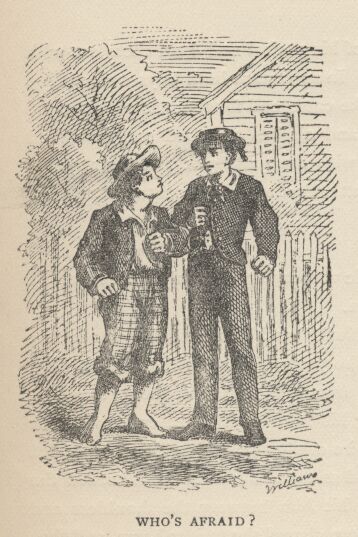
Another pause, and more eying and sidling around each other. Presently they were shoulder to shoulder. Tom said:
"Get away from here!"
"Go away yourself!"
"I won't."
"I won't either."
So they stood, each with a foot placed at an angle as a brace, and both shoving with might and main, and glowering at each other with hate. But neither could get an advantage. After struggling till both were hot and flushed, each relaxed his strain with watchful caution, and Tom said:
"You're a coward and a pup. I'll tell my big brother on you, and he can thrash you with his little finger, and I'll make him do it, too."
"What do I care for your big brother? I've got a brother that's bigger than he is—and what's more, he can throw him over that fence, too." [Both brothers were imaginary.]
"That's a lie."
"YOUR saying so don't make it so."
Tom drew a line in the dust with his big toe, and said:
"I dare you to step over that, and I'll lick you till you can't stand up. Anybody that'll take a dare will steal sheep."
The new boy stepped over promptly, and said:
"Now you said you'd do it, now let's see you do it."
"Don't you crowd me now; you better look out."
"Well, you SAID you'd do it—why don't you do it?"
"By jingo! for two cents I WILL do it."
The new boy took two broad coppers out of his pocket and held them out with derision. Tom struck them to the ground. In an instant both boys were rolling and tumbling in the dirt, gripped together like cats; and for the space of a minute they tugged and tore at each other's hair and clothes, punched and scratched each other's nose, and covered themselves with dust and glory. Presently the confusion took form, and through the fog of battle Tom appeared, seated astride the new boy, and pounding him with his fists. "Holler 'nuff!" said he.
The boy only struggled to free himself. He was crying—mainly from rage.
"Holler 'nuff!"—and the pounding went on.
At last the stranger got out a smothered "'Nuff!" and Tom let him up and said:
"Now that'll learn you. Better look out who you're fooling with next time."
The new boy went off brushing the dust from his clothes, sobbing, snuffling, and occasionally looking back and shaking his head and threatening what he would do to Tom the "next time he caught him out." To which Tom responded with jeers, and started off in high feather, and as soon as his back was turned the new boy snatched up a stone, threw it and hit him between the shoulders and then turned tail and ran like an antelope. Tom chased the traitor home, and thus found out where he lived. He then held a position at the gate for some time, daring the enemy to come outside, but the enemy only made faces at him through the window and declined. At last the enemy's mother appeared, and called Tom a bad, vicious, vulgar child, and ordered him away. So he went away; but he said he "'lowed" to "lay" for that boy.
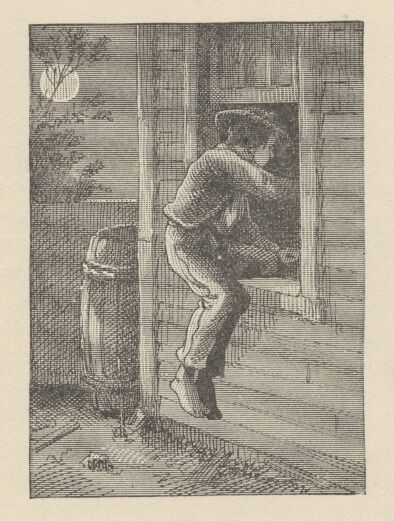
He got home pretty late that night, and when he climbed cautiously in at the window, he uncovered an ambuscade, in the person of his aunt; and when she saw the state his clothes were in her resolution to turn his Saturday holiday into captivity at hard labor became adamantine in its firmness.
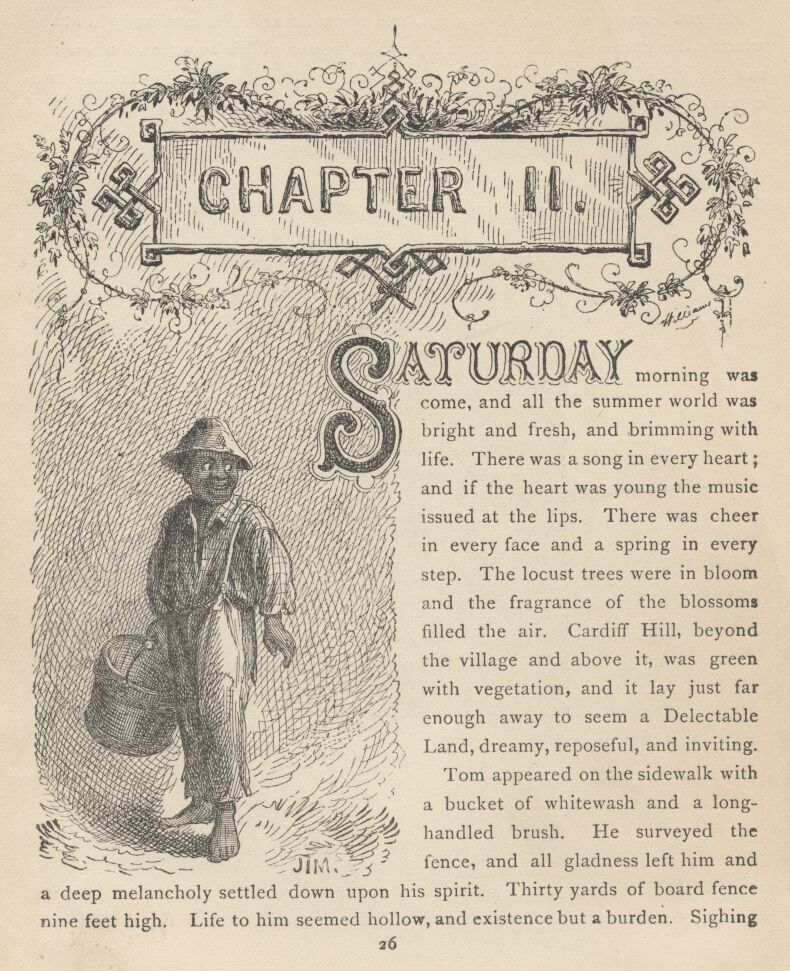
SATURDAY morning was come, and all the summer world was bright and fresh, and brimming with life. There was a song in every heart; and if the heart was young the music issued at the lips. There was cheer in every face and a spring in every step. The locust-trees were in bloom and the fragrance of the blossoms filled the air. Cardiff Hill, beyond the village and above it, was green with vegetation and it lay just far enough away to seem a Delectable Land, dreamy, reposeful, and inviting.
Tom appeared on the sidewalk with a bucket of whitewash and a long-handled brush. He surveyed the fence, and all gladness left him and a deep melancholy settled down upon his spirit. Thirty yards of board fence nine feet high. Life to him seemed hollow, and existence but a burden. Sighing, he dipped his brush and passed it along the topmost plank; repeated the operation; did it again; compared the insignificant whitewashed streak with the far-reaching continent of unwhitewashed fence, and sat down on a tree-box discouraged. Jim came skipping out at the gate with a tin pail, and singing Buffalo Gals. Bringing water from the town pump had always been hateful work in Tom's eyes, before, but now it did not strike him so. He remembered that there was company at the pump. White, mulatto, and negro boys and girls were always there waiting their turns, resting, trading playthings, quarrelling, fighting, skylarking. And he remembered that although the pump was only a hundred and fifty yards off, Jim never got back with a bucket of water under an hour—and even then somebody generally had to go after him. Tom said:
"Say, Jim, I'll fetch the water if you'll whitewash some."
Jim shook his head and said:
"Can't, Mars Tom. Ole missis, she tole me I got to go an' git dis water an' not stop foolin' roun' wid anybody. She say she spec' Mars Tom gwine to ax me to whitewash, an' so she tole me go 'long an' 'tend to my own business—she 'lowed SHE'D 'tend to de whitewashin'."
"Oh, never you mind what she said, Jim. That's the way she always talks. Gimme the bucket—I won't be gone only a a minute. SHE won't ever know."
"Oh, I dasn't, Mars Tom. Ole missis she'd take an' tar de head off'n me. 'Deed she would."
"SHE! She never licks anybody—whacks 'em over the head with her thimble—and who cares for that, I'd like to know. She talks awful, but talk don't hurt—anyways it don't if she don't cry. Jim, I'll give you a marvel. I'll give you a white alley!"
Jim began to waver.
"White alley, Jim! And it's a bully taw."
"My! Dat's a mighty gay marvel, I tell you! But Mars Tom I's powerful 'fraid ole missis—"
"And besides, if you will I'll show you my sore toe."
Jim was only human—this attraction was too much for him. He put down his pail, took the white alley, and bent over the toe with absorbing interest while the bandage was being unwound. In another moment he was flying down the street with his pail and a tingling rear, Tom was whitewashing with vigor, and Aunt Polly was retiring from the field with a slipper in her hand and triumph in her eye.
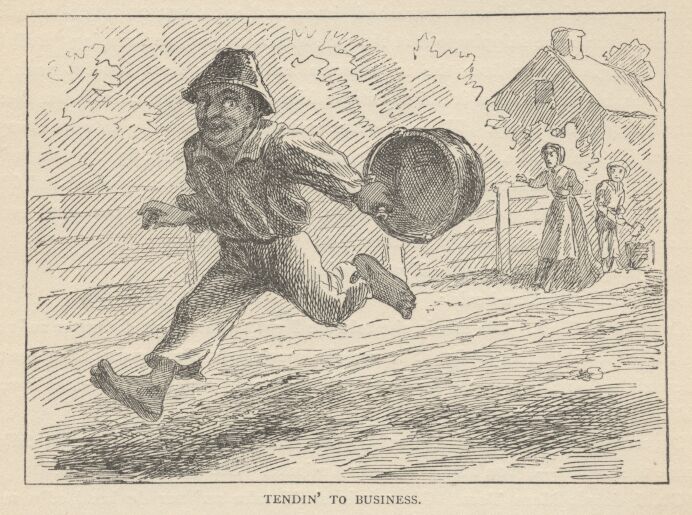
But Tom's energy did not last. He began to think of the fun he had planned for this day, and his sorrows multiplied. Soon the free boys would come tripping along on all sorts of delicious expeditions, and they would make a world of fun of him for having to work—the very thought of it burnt him like fire. He got out his worldly wealth and examined it—bits of toys, marbles, and trash; enough to buy an exchange of WORK, maybe, but not half enough to buy so much as half an hour of pure freedom. So he returned his straitened means to his pocket, and gave up the idea of trying to buy the boys. At this dark and hopeless moment an inspiration burst upon him! Nothing less than a great, magnificent inspiration.
He took up his brush and went tranquilly to work. Ben Rogers hove in sight presently—the very boy, of all boys, whose ridicule he had been dreading. Ben's gait was the hop-skip-and-jump—proof enough that his heart was light and his anticipations high. He was eating an apple, and giving a long, melodious whoop, at intervals, followed by a deep-toned ding-dong-dong, ding-dong-dong, for he was personating a steamboat. As he drew near, he slackened speed, took the middle of the street, leaned far over to starboard and rounded to ponderously and with laborious pomp and circumstance—for he was personating the Big Missouri, and considered himself to be drawing nine feet of water. He was boat and captain and engine-bells combined, so he had to imagine himself standing on his own hurricane-deck giving the orders and executing them:
"Stop her, sir! Ting-a-ling-ling!" The headway ran almost out, and he drew up slowly toward the sidewalk.
"Ship up to back! Ting-a-ling-ling!" His arms straightened and stiffened down his sides.
"Set her back on the stabboard! Ting-a-ling-ling! Chow! ch-chow-wow! Chow!" His right hand, mean-time, describing stately circles—for it was representing a forty-foot wheel.
"Let her go back on the labboard! Ting-a-ling-ling! Chow-ch-chow-chow!" The left hand began to describe circles.
"Stop the stabboard! Ting-a-ling-ling! Stop the labboard! Come ahead on the stabboard! Stop her! Let your outside turn over slow! Ting-a-ling- ling! Chow-ow-ow! Get out that head-line! LIVELY now! Come—out with your spring-line—what're you about there! Take a turn round that stump with the bight of it! Stand by that stage, now—let her go! Done with the engines, sir! Ting-a-ling-ling! SH'T! S'H'T! SH'T!" (trying the gauge-cocks).
Tom went on whitewashing—paid no attention to the steamboat. Ben stared a moment and then said: "Hi-YI! YOU'RE up a stump, ain't you!"
No answer. Tom surveyed his last touch with the eye of an artist, then he gave his brush another gentle sweep and surveyed the result, as before. Ben ranged up alongside of him. Tom's mouth watered for the apple, but he stuck to his work. Ben said:
"Hello, old chap, you got to work, hey?"
Tom wheeled suddenly and said:
"Why, it's you, Ben! I warn't noticing."
"Say—I'm going in a-swimming, I am. Don't you wish you could? But of course you'd druther WORK—wouldn't you? Course you would!"
Tom contemplated the boy a bit, and said:
"What do you call work?"
"Why, ain't THAT work?"
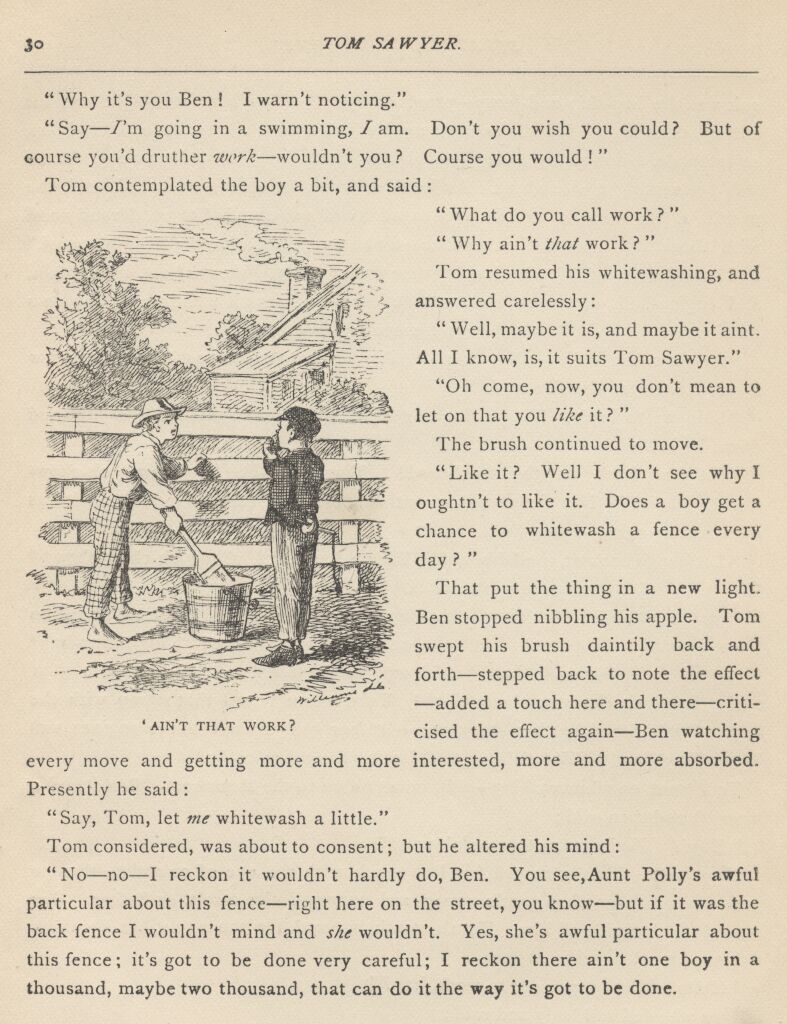
Tom resumed his whitewashing, and answered carelessly:
"Well, maybe it is, and maybe it ain't. All I know, is, it suits Tom Sawyer."
"Oh come, now, you don't mean to let on that you LIKE it?"
The brush continued to move.
"Like it? Well, I don't see why I oughtn't to like it. Does a boy get a chance to whitewash a fence every day?"
That put the thing in a new light. Ben stopped nibbling his apple. Tom swept his brush daintily back and forth—stepped back to note the effect—added a touch here and there—criticised the effect again—Ben watching every move and getting more and more interested, more and more absorbed. Presently he said:
"Say, Tom, let ME whitewash a little."
Tom considered, was about to consent; but he altered his mind:
"No—no—I reckon it wouldn't hardly do, Ben. You see, Aunt Polly's awful particular about this fence—right here on the street, you know—but if it was the back fence I wouldn't mind and SHE wouldn't. Yes, she's awful particular about this fence; it's got to be done very careful; I reckon there ain't one boy in a thousand, maybe two thousand, that can do it the way it's got to be done."
"No—is that so? Oh come, now—lemme just try. Only just a little—I'd let YOU, if you was me, Tom."
"Ben, I'd like to, honest injun; but Aunt Polly—well, Jim wanted to do it, but she wouldn't let him; Sid wanted to do it, and she wouldn't let Sid. Now don't you see how I'm fixed? If you was to tackle this fence and anything was to happen to it—"
"Oh, shucks, I'll be just as careful. Now lemme try. Say—I'll give you the core of my apple."
"Well, here—No, Ben, now don't. I'm afeard—"
"I'll give you ALL of it!"
Tom gave up the brush with reluctance in his face, but alacrity in his heart. And while the late steamer Big Missouri worked and sweated in the sun, the retired artist sat on a barrel in the shade close by, dangled his legs, munched his apple, and planned the slaughter of more innocents. There was no lack of material; boys happened along every little while; they came to jeer, but remained to whitewash. By the time Ben was fagged out, Tom had traded the next chance to Billy Fisher for a kite, in good repair; and when he played out, Johnny Miller bought in for a dead rat and a string to swing it with—and so on, and so on, hour after hour. And when the middle of the afternoon came, from being a poor poverty-stricken boy in the morning, Tom was literally rolling in wealth. He had besides the things before mentioned, twelve marbles, part of a jews-harp, a piece of blue bottle-glass to look through, a spool cannon, a key that wouldn't unlock anything, a fragment of chalk, a glass stopper of a decanter, a tin soldier, a couple of tadpoles, six fire-crackers, a kitten with only one eye, a brass door-knob, a dog-collar—but no dog—the handle of a knife, four pieces of orange-peel, and a dilapidated old window sash.
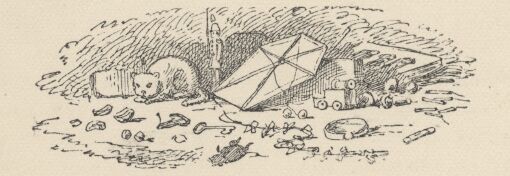
He had had a nice, good, idle time all the while—plenty of company—and the fence had three coats of whitewash on it! If he hadn't run out of whitewash he would have bankrupted every boy in the village.
Tom said to himself that it was not such a hollow world, after all. He had discovered a great law of human action, without knowing it—namely, that in order to make a man or a boy covet a thing, it is only necessary to make the thing difficult to attain. If he had been a great and wise philosopher, like the writer of this book, he would now have comprehended that Work consists of whatever a body is OBLIGED to do, and that Play consists of whatever a body is not obliged to do. And this would help him to understand why constructing artificial flowers or performing on a tread-mill is work, while rolling ten-pins or climbing Mont Blanc is only amusement. There are wealthy gentlemen in England who drive four-horse passenger-coaches twenty or thirty miles on a daily line, in the summer, because the privilege costs them considerable money; but if they were offered wages for the service, that would turn it into work and then they would resign.
The boy mused awhile over the substantial change which had taken place in his worldly circumstances, and then wended toward headquarters to report.
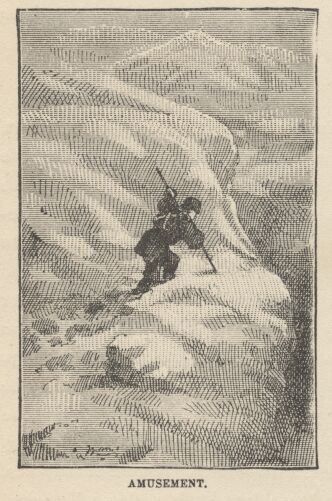
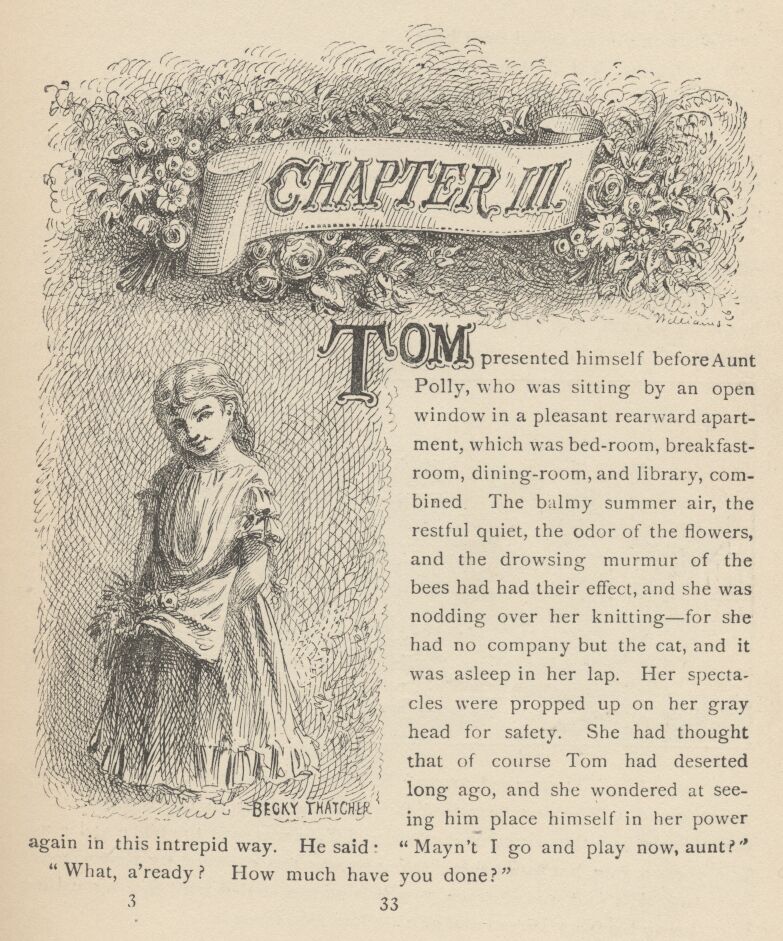
TOM presented himself before Aunt Polly, who was sitting by an open window in a pleasant rearward apartment, which was bedroom, breakfast-room, dining-room, and library, combined. The balmy summer air, the restful quiet, the odor of the flowers, and the drowsing murmur of the bees had had their effect, and she was nodding over her knitting—for she had no company but the cat, and it was asleep in her lap. Her spectacles were propped up on her gray head for safety. She had thought that of course Tom had deserted long ago, and she wondered at seeing him place himself in her power again in this intrepid way. He said: "Mayn't I go and play now, aunt?"
"What, a'ready? How much have you done?"
"It's all done, aunt."
"Tom, don't lie to me—I can't bear it."
"I ain't, aunt; it IS all done."
Aunt Polly placed small trust in such evidence. She went out to see for herself; and she would have been content to find twenty per cent. of Tom's statement true. When she found the entire fence white-washed, and not only whitewashed but elaborately coated and recoated, and even a streak added to the ground, her astonishment was almost unspeakable. She said:
"Well, I never! There's no getting round it, you can work when you're a mind to, Tom." And then she diluted the compliment by adding, "But it's powerful seldom you're a mind to, I'm bound to say. Well, go 'long and play; but mind you get back some time in a week, or I'll tan you."
She was so overcome by the splendor of his achievement that she took him into the closet and selected a choice apple and delivered it to him, along with an improving lecture upon the added value and flavor a treat took to itself when it came without sin through virtuous effort. And while she closed with a happy Scriptural flourish, he "hooked" a doughnut.
Then he skipped out, and saw Sid just starting up the outside stairway that led to the back rooms on the second floor. Clods were handy and the air was full of them in a twinkling. They raged around Sid like a hail-storm; and before Aunt Polly could collect her surprised faculties and sally to the rescue, six or seven clods had taken personal effect, and Tom was over the fence and gone. There was a gate, but as a general thing he was too crowded for time to make use of it. His soul was at peace, now that he had settled with Sid for calling attention to his black thread and getting him into trouble.
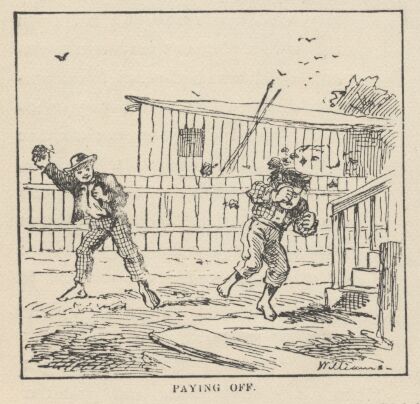
Tom skirted the block, and came round into a muddy alley that led by the back of his aunt's cow-stable. He presently got safely beyond the reach of capture and punishment, and hastened toward the public square of the village, where two "military" companies of boys had met for conflict, according to previous appointment. Tom was General of one of these armies, Joe Harper (a bosom friend) General of the other. These two great commanders did not condescend to fight in person—that being better suited to the still smaller fry—but sat together on an eminence and conducted the field operations by orders delivered through aides-de-camp. Tom's army won a great victory, after a long and hard-fought battle. Then the dead were counted, prisoners exchanged, the terms of the next disagreement agreed upon, and the day for the necessary battle appointed; after which the armies fell into line and marched away, and Tom turned homeward alone.
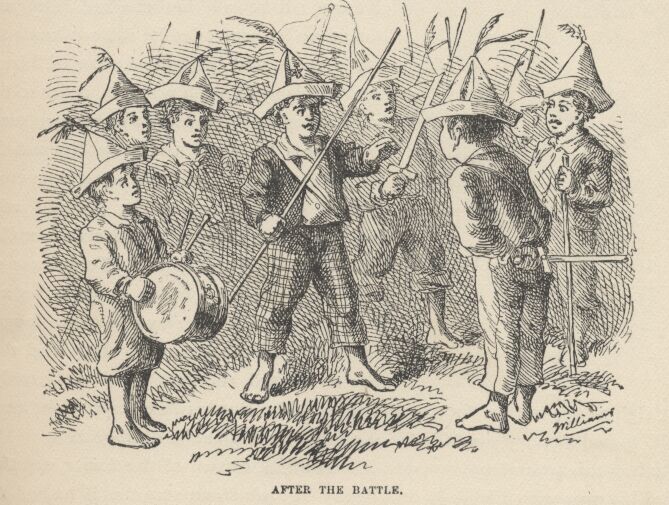
As he was passing by the house where Jeff Thatcher lived, he saw a new girl in the garden—a lovely little blue-eyed creature with yellow hair plaited into two long-tails, white summer frock and embroidered pan-talettes. The fresh-crowned hero fell without firing a shot. A certain Amy Lawrence vanished out of his heart and left not even a memory of herself behind. He had thought he loved her to distraction; he had regarded his passion as adoration; and behold it was only a poor little evanescent partiality. He had been months winning her; she had confessed hardly a week ago; he had been the happiest and the proudest boy in the world only seven short days, and here in one instant of time she had gone out of his heart like a casual stranger whose visit is done.
He worshipped this new angel with furtive eye, till he saw that she had discovered him; then he pretended he did not know she was present, and began to "show off" in all sorts of absurd boyish ways, in order to win her admiration. He kept up this grotesque foolishness for some time; but by-and-by, while he was in the midst of some dangerous gymnastic performances, he glanced aside and saw that the little girl was wending her way toward the house. Tom came up to the fence and leaned on it, grieving, and hoping she would tarry yet awhile longer. She halted a moment on the steps and then moved toward the door. Tom heaved a great sigh as she put her foot on the threshold. But his face lit up, right away, for she tossed a pansy over the fence a moment before she disappeared.
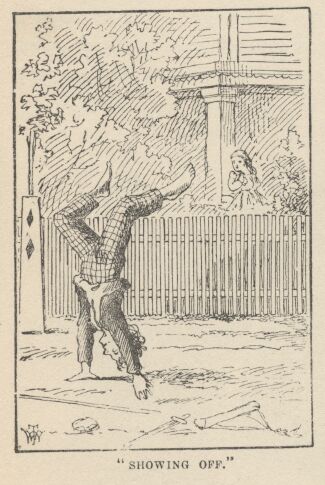
The boy ran around and stopped within a foot or two of the flower, and then shaded his eyes with his hand and began to look down street as if he had discovered something of interest going on in that direction. Presently he picked up a straw and began trying to balance it on his nose, with his head tilted far back; and as he moved from side to side, in his efforts, he edged nearer and nearer toward the pansy; finally his bare foot rested upon it, his pliant toes closed upon it, and he hopped away with the treasure and disappeared round the corner. But only for a minute—only while he could button the flower inside his jacket, next his heart—or next his stomach, possibly, for he was not much posted in anatomy, and not hypercritical, anyway.
He returned, now, and hung about the fence till nightfall, "showing off," as before; but the girl never exhibited herself again, though Tom comforted himself a little with the hope that she had been near some window, meantime, and been aware of his attentions. Finally he strode home reluctantly, with his poor head full of visions.
All through supper his spirits were so high that his aunt wondered "what had got into the child." He took a good scolding about clodding Sid, and did not seem to mind it in the least. He tried to steal sugar under his aunt's very nose, and got his knuckles rapped for it. He said:
"Aunt, you don't whack Sid when he takes it."
"Well, Sid don't torment a body the way you do. You'd be always into that sugar if I warn't watching you."
Presently she stepped into the kitchen, and Sid, happy in his immunity, reached for the sugar-bowl—a sort of glorying over Tom which was wellnigh unbearable. But Sid's fingers slipped and the bowl dropped and broke. Tom was in ecstasies. In such ecstasies that he even controlled his tongue and was silent. He said to himself that he would not speak a word, even when his aunt came in, but would sit perfectly still till she asked who did the mischief; and then he would tell, and there would be nothing so good in the world as to see that pet model "catch it." He was so brimful of exultation that he could hardly hold himself when the old lady came back and stood above the wreck discharging lightnings of wrath from over her spectacles. He said to himself, "Now it's coming!" And the next instant he was sprawling on the floor! The potent palm was uplifted to strike again when Tom cried out:
"Hold on, now, what 'er you belting ME for?—Sid broke it!"
Aunt Polly paused, perplexed, and Tom looked for healing pity. But when she got her tongue again, she only said:
"Umf! Well, you didn't get a lick amiss, I reckon. You been into some other audacious mischief when I wasn't around, like enough."
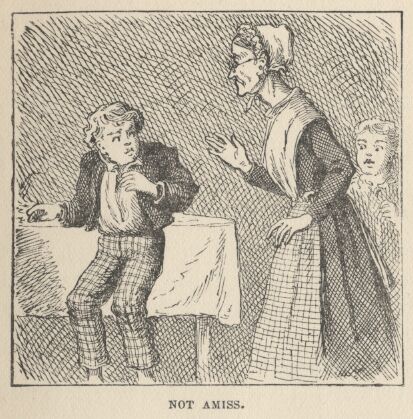
Then her conscience reproached her, and she yearned to say something kind and loving; but she judged that this would be construed into a confession that she had been in the wrong, and discipline forbade that. So she kept silence, and went about her affairs with a troubled heart. Tom sulked in a corner and exalted his woes. He knew that in her heart his aunt was on her knees to him, and he was morosely gratified by the consciousness of it. He would hang out no signals, he would take notice of none. He knew that a yearning glance fell upon him, now and then, through a film of tears, but he refused recognition of it. He pictured himself lying sick unto death and his aunt bending over him beseeching one little forgiving word, but he would turn his face to the wall, and die with that word unsaid. Ah, how would she feel then? And he pictured himself brought home from the river, dead, with his curls all wet, and his sore heart at rest. How she would throw herself upon him, and how her tears would fall like rain, and her lips pray God to give her back her boy and she would never, never abuse him any more! But he would lie there cold and white and make no sign—a poor little sufferer, whose griefs were at an end. He so worked upon his feelings with the pathos of these dreams, that he had to keep swallowing, he was so like to choke; and his eyes swam in a blur of water, which overflowed when he winked, and ran down and trickled from the end of his nose. And such a luxury to him was this petting of his sorrows, that he could not bear to have any worldly cheeriness or any grating delight intrude upon it; it was too sacred for such contact; and so, presently, when his cousin Mary danced in, all alive with the joy of seeing home again after an age-long visit of one week to the country, he got up and moved in clouds and darkness out at one door as she brought song and sunshine in at the other.
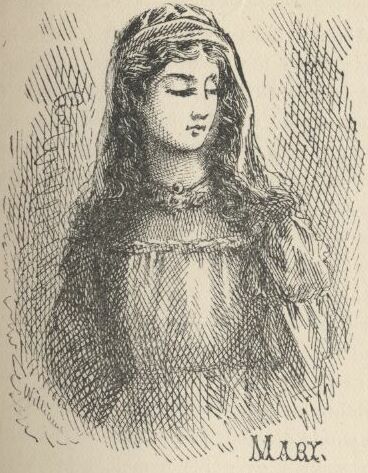
He wandered far from the accustomed haunts of boys, and sought desolate places that were in harmony with his spirit. A log raft in the river invited him, and he seated himself on its outer edge and contemplated the dreary vastness of the stream, wishing, the while, that he could only be drowned, all at once and unconsciously, without undergoing the uncomfortable routine devised by nature. Then he thought of his flower. He got it out, rumpled and wilted, and it mightily increased his dismal felicity. He wondered if she would pity him if she knew? Would she cry, and wish that she had a right to put her arms around his neck and comfort him? Or would she turn coldly away like all the hollow world? This picture brought such an agony of pleasurable suffering that he worked it over and over again in his mind and set it up in new and varied lights, till he wore it threadbare. At last he rose up sighing and departed in the darkness.
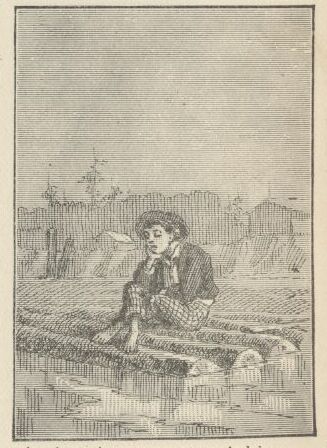
About half-past nine or ten o'clock he came along the deserted street to where the Adored Unknown lived; he paused a moment; no sound fell upon his listening ear; a candle was casting a dull glow upon the curtain of a second-story window. Was the sacred presence there? He climbed the fence, threaded his stealthy way through the plants, till he stood under that window; he looked up at it long, and with emotion; then he laid him down on the ground under it, disposing himself upon his back, with his hands clasped upon his breast and holding his poor wilted flower. And thus he would die—out in the cold world, with no shelter over his homeless head, no friendly hand to wipe the death-damps from his brow, no loving face to bend pityingly over him when the great agony came. And thus SHE would see him when she looked out upon the glad morning, and oh! would she drop one little tear upon his poor, lifeless form, would she heave one little sigh to see a bright young life so rudely blighted, so untimely cut down?
The window went up, a maid-servant's discordant voice profaned the holy calm, and a deluge of water drenched the prone martyr's remains!
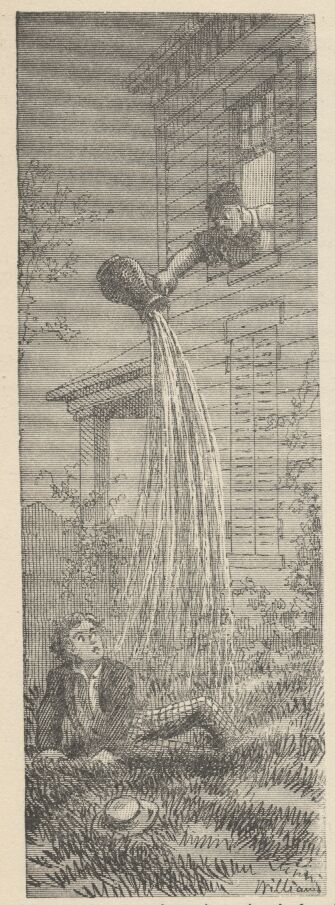
The strangling hero sprang up with a relieving snort. There was a whiz as of a missile in the air, mingled with the murmur of a curse, a sound as of shivering glass followed, and a small, vague form went over the fence and shot away in the gloom.
Not long after, as Tom, all undressed for bed, was surveying his drenched garments by the light of a tallow dip, Sid woke up; but if he had any dim idea of making any "references to allusions," he thought better of it and held his peace, for there was danger in Tom's eye.
Tom turned in without the added vexation of prayers, and Sid made mental note of the omission.

End of the Project Gutenberg EBook of The Adventures of Tom Sawyer, Part 1.
by Mark Twain (Samuel Clemens)
*** END OF THIS PROJECT GUTENBERG EBOOK TOM SAWYER, PART 1. ***
***** This file should be named 7193-h.htm or 7193-h.zip *****
This and all associated files of various formats will be found in:
https://www.gutenberg.org/7/1/9/7193/
Produced by David Widger
Updated editions will replace the previous one--the old editions
will be renamed.
Creating the works from public domain print editions means that no
one owns a United States copyright in these works, so the Foundation
(and you!) can copy and distribute it in the United States without
permission and without paying copyright royalties. Special rules,
set forth in the General Terms of Use part of this license, apply to
copying and distributing Project Gutenberg-tm electronic works to
protect the PROJECT GUTENBERG-tm concept and trademark. Project
Gutenberg is a registered trademark, and may not be used if you
charge for the eBooks, unless you receive specific permission. If you
do not charge anything for copies of this eBook, complying with the
rules is very easy. You may use this eBook for nearly any purpose
such as creation of derivative works, reports, performances and
research. They may be modified and printed and given away--you may do
practically ANYTHING with public domain eBooks. Redistribution is
subject to the trademark license, especially commercial
redistribution.
*** START: FULL LICENSE ***
THE FULL PROJECT GUTENBERG LICENSE
PLEASE READ THIS BEFORE YOU DISTRIBUTE OR USE THIS WORK
To protect the Project Gutenberg-tm mission of promoting the free
distribution of electronic works, by using or distributing this work
(or any other work associated in any way with the phrase "Project
Gutenberg"), you agree to comply with all the terms of the Full Project
Gutenberg-tm License (available with this file or online at
https://gutenberg.org/license).
Section 1. General Terms of Use and Redistributing Project Gutenberg-tm
electronic works
1.A. By reading or using any part of this Project Gutenberg-tm
electronic work, you indicate that you have read, understand, agree to
and accept all the terms of this license and intellectual property
(trademark/copyright) agreement. If you do not agree to abide by all
the terms of this agreement, you must cease using and return or destroy
all copies of Project Gutenberg-tm electronic works in your possession.
If you paid a fee for obtaining a copy of or access to a Project
Gutenberg-tm electronic work and you do not agree to be bound by the
terms of this agreement, you may obtain a refund from the person or
entity to whom you paid the fee as set forth in paragraph 1.E.8.
1.B. "Project Gutenberg" is a registered trademark. It may only be
used on or associated in any way with an electronic work by people who
agree to be bound by the terms of this agreement. There are a few
things that you can do with most Project Gutenberg-tm electronic works
even without complying with the full terms of this agreement. See
paragraph 1.C below. There are a lot of things you can do with Project
Gutenberg-tm electronic works if you follow the terms of this agreement
and help preserve free future access to Project Gutenberg-tm electronic
works. See paragraph 1.E below.
1.C. The Project Gutenberg Literary Archive Foundation ("the Foundation"
or PGLAF), owns a compilation copyright in the collection of Project
Gutenberg-tm electronic works. Nearly all the individual works in the
collection are in the public domain in the United States. If an
individual work is in the public domain in the United States and you are
located in the United States, we do not claim a right to prevent you from
copying, distributing, performing, displaying or creating derivative
works based on the work as long as all references to Project Gutenberg
are removed. Of course, we hope that you will support the Project
Gutenberg-tm mission of promoting free access to electronic works by
freely sharing Project Gutenberg-tm works in compliance with the terms of
this agreement for keeping the Project Gutenberg-tm name associated with
the work. You can easily comply with the terms of this agreement by
keeping this work in the same format with its attached full Project
Gutenberg-tm License when you share it without charge with others.
1.D. The copyright laws of the place where you are located also govern
what you can do with this work. Copyright laws in most countries are in
a constant state of change. If you are outside the United States, check
the laws of your country in addition to the terms of this agreement
before downloading, copying, displaying, performing, distributing or
creating derivative works based on this work or any other Project
Gutenberg-tm work. The Foundation makes no representations concerning
the copyright status of any work in any country outside the United
States.
1.E. Unless you have removed all references to Project Gutenberg:
1.E.1. The following sentence, with active links to, or other immediate
access to, the full Project Gutenberg-tm License must appear prominently
whenever any copy of a Project Gutenberg-tm work (any work on which the
phrase "Project Gutenberg" appears, or with which the phrase "Project
Gutenberg" is associated) is accessed, displayed, performed, viewed,
copied or distributed:
This eBook is for the use of anyone anywhere at no cost and with
almost no restrictions whatsoever. You may copy it, give it away or
re-use it under the terms of the Project Gutenberg License included
with this eBook or online at www.gutenberg.org
1.E.2. If an individual Project Gutenberg-tm electronic work is derived
from the public domain (does not contain a notice indicating that it is
posted with permission of the copyright holder), the work can be copied
and distributed to anyone in the United States without paying any fees
or charges. If you are redistributing or providing access to a work
with the phrase "Project Gutenberg" associated with or appearing on the
work, you must comply either with the requirements of paragraphs 1.E.1
through 1.E.7 or obtain permission for the use of the work and the
Project Gutenberg-tm trademark as set forth in paragraphs 1.E.8 or
1.E.9.
1.E.3. If an individual Project Gutenberg-tm electronic work is posted
with the permission of the copyright holder, your use and distribution
must comply with both paragraphs 1.E.1 through 1.E.7 and any additional
terms imposed by the copyright holder. Additional terms will be linked
to the Project Gutenberg-tm License for all works posted with the
permission of the copyright holder found at the beginning of this work.
1.E.4. Do not unlink or detach or remove the full Project Gutenberg-tm
License terms from this work, or any files containing a part of this
work or any other work associated with Project Gutenberg-tm.
1.E.5. Do not copy, display, perform, distribute or redistribute this
electronic work, or any part of this electronic work, without
prominently displaying the sentence set forth in paragraph 1.E.1 with
active links or immediate access to the full terms of the Project
Gutenberg-tm License.
1.E.6. You may convert to and distribute this work in any binary,
compressed, marked up, nonproprietary or proprietary form, including any
word processing or hypertext form. However, if you provide access to or
distribute copies of a Project Gutenberg-tm work in a format other than
"Plain Vanilla ASCII" or other format used in the official version
posted on the official Project Gutenberg-tm web site (www.gutenberg.org),
you must, at no additional cost, fee or expense to the user, provide a
copy, a means of exporting a copy, or a means of obtaining a copy upon
request, of the work in its original "Plain Vanilla ASCII" or other
form. Any alternate format must include the full Project Gutenberg-tm
License as specified in paragraph 1.E.1.
1.E.7. Do not charge a fee for access to, viewing, displaying,
performing, copying or distributing any Project Gutenberg-tm works
unless you comply with paragraph 1.E.8 or 1.E.9.
1.E.8. You may charge a reasonable fee for copies of or providing
access to or distributing Project Gutenberg-tm electronic works provided
that
- You pay a royalty fee of 20% of the gross profits you derive from
the use of Project Gutenberg-tm works calculated using the method
you already use to calculate your applicable taxes. The fee is
owed to the owner of the Project Gutenberg-tm trademark, but he
has agreed to donate royalties under this paragraph to the
Project Gutenberg Literary Archive Foundation. Royalty payments
must be paid within 60 days following each date on which you
prepare (or are legally required to prepare) your periodic tax
returns. Royalty payments should be clearly marked as such and
sent to the Project Gutenberg Literary Archive Foundation at the
address specified in Section 4, "Information about donations to
the Project Gutenberg Literary Archive Foundation."
- You provide a full refund of any money paid by a user who notifies
you in writing (or by e-mail) within 30 days of receipt that s/he
does not agree to the terms of the full Project Gutenberg-tm
License. You must require such a user to return or
destroy all copies of the works possessed in a physical medium
and discontinue all use of and all access to other copies of
Project Gutenberg-tm works.
- You provide, in accordance with paragraph 1.F.3, a full refund of any
money paid for a work or a replacement copy, if a defect in the
electronic work is discovered and reported to you within 90 days
of receipt of the work.
- You comply with all other terms of this agreement for free
distribution of Project Gutenberg-tm works.
1.E.9. If you wish to charge a fee or distribute a Project Gutenberg-tm
electronic work or group of works on different terms than are set
forth in this agreement, you must obtain permission in writing from
both the Project Gutenberg Literary Archive Foundation and Michael
Hart, the owner of the Project Gutenberg-tm trademark. Contact the
Foundation as set forth in Section 3 below.
1.F.
1.F.1. Project Gutenberg volunteers and employees expend considerable
effort to identify, do copyright research on, transcribe and proofread
public domain works in creating the Project Gutenberg-tm
collection. Despite these efforts, Project Gutenberg-tm electronic
works, and the medium on which they may be stored, may contain
"Defects," such as, but not limited to, incomplete, inaccurate or
corrupt data, transcription errors, a copyright or other intellectual
property infringement, a defective or damaged disk or other medium, a
computer virus, or computer codes that damage or cannot be read by
your equipment.
1.F.2. LIMITED WARRANTY, DISCLAIMER OF DAMAGES - Except for the "Right
of Replacement or Refund" described in paragraph 1.F.3, the Project
Gutenberg Literary Archive Foundation, the owner of the Project
Gutenberg-tm trademark, and any other party distributing a Project
Gutenberg-tm electronic work under this agreement, disclaim all
liability to you for damages, costs and expenses, including legal
fees. YOU AGREE THAT YOU HAVE NO REMEDIES FOR NEGLIGENCE, STRICT
LIABILITY, BREACH OF WARRANTY OR BREACH OF CONTRACT EXCEPT THOSE
PROVIDED IN PARAGRAPH F3. YOU AGREE THAT THE FOUNDATION, THE
TRADEMARK OWNER, AND ANY DISTRIBUTOR UNDER THIS AGREEMENT WILL NOT BE
LIABLE TO YOU FOR ACTUAL, DIRECT, INDIRECT, CONSEQUENTIAL, PUNITIVE OR
INCIDENTAL DAMAGES EVEN IF YOU GIVE NOTICE OF THE POSSIBILITY OF SUCH
DAMAGE.
1.F.3. LIMITED RIGHT OF REPLACEMENT OR REFUND - If you discover a
defect in this electronic work within 90 days of receiving it, you can
receive a refund of the money (if any) you paid for it by sending a
written explanation to the person you received the work from. If you
received the work on a physical medium, you must return the medium with
your written explanation. The person or entity that provided you with
the defective work may elect to provide a replacement copy in lieu of a
refund. If you received the work electronically, the person or entity
providing it to you may choose to give you a second opportunity to
receive the work electronically in lieu of a refund. If the second copy
is also defective, you may demand a refund in writing without further
opportunities to fix the problem.
1.F.4. Except for the limited right of replacement or refund set forth
in paragraph 1.F.3, this work is provided to you 'AS-IS' WITH NO OTHER
WARRANTIES OF ANY KIND, EXPRESS OR IMPLIED, INCLUDING BUT NOT LIMITED TO
WARRANTIES OF MERCHANTIBILITY OR FITNESS FOR ANY PURPOSE.
1.F.5. Some states do not allow disclaimers of certain implied
warranties or the exclusion or limitation of certain types of damages.
If any disclaimer or limitation set forth in this agreement violates the
law of the state applicable to this agreement, the agreement shall be
interpreted to make the maximum disclaimer or limitation permitted by
the applicable state law. The invalidity or unenforceability of any
provision of this agreement shall not void the remaining provisions.
1.F.6. INDEMNITY - You agree to indemnify and hold the Foundation, the
trademark owner, any agent or employee of the Foundation, anyone
providing copies of Project Gutenberg-tm electronic works in accordance
with this agreement, and any volunteers associated with the production,
promotion and distribution of Project Gutenberg-tm electronic works,
harmless from all liability, costs and expenses, including legal fees,
that arise directly or indirectly from any of the following which you do
or cause to occur: (a) distribution of this or any Project Gutenberg-tm
work, (b) alteration, modification, or additions or deletions to any
Project Gutenberg-tm work, and (c) any Defect you cause.
Section 2. Information about the Mission of Project Gutenberg-tm
Project Gutenberg-tm is synonymous with the free distribution of
electronic works in formats readable by the widest variety of computers
including obsolete, old, middle-aged and new computers. It exists
because of the efforts of hundreds of volunteers and donations from
people in all walks of life.
Volunteers and financial support to provide volunteers with the
assistance they need, is critical to reaching Project Gutenberg-tm's
goals and ensuring that the Project Gutenberg-tm collection will
remain freely available for generations to come. In 2001, the Project
Gutenberg Literary Archive Foundation was created to provide a secure
and permanent future for Project Gutenberg-tm and future generations.
To learn more about the Project Gutenberg Literary Archive Foundation
and how your efforts and donations can help, see Sections 3 and 4
and the Foundation web page at https://www.pglaf.org.
Section 3. Information about the Project Gutenberg Literary Archive
Foundation
The Project Gutenberg Literary Archive Foundation is a non profit
501(c)(3) educational corporation organized under the laws of the
state of Mississippi and granted tax exempt status by the Internal
Revenue Service. The Foundation's EIN or federal tax identification
number is 64-6221541. Its 501(c)(3) letter is posted at
https://pglaf.org/fundraising. Contributions to the Project Gutenberg
Literary Archive Foundation are tax deductible to the full extent
permitted by U.S. federal laws and your state's laws.
The Foundation's principal office is located at 4557 Melan Dr. S.
Fairbanks, AK, 99712., but its volunteers and employees are scattered
throughout numerous locations. Its business office is located at
809 North 1500 West, Salt Lake City, UT 84116, (801) 596-1887, email
business@pglaf.org. Email contact links and up to date contact
information can be found at the Foundation's web site and official
page at https://pglaf.org
For additional contact information:
Dr. Gregory B. Newby
Chief Executive and Director
gbnewby@pglaf.org
Section 4. Information about Donations to the Project Gutenberg
Literary Archive Foundation
Project Gutenberg-tm depends upon and cannot survive without wide
spread public support and donations to carry out its mission of
increasing the number of public domain and licensed works that can be
freely distributed in machine readable form accessible by the widest
array of equipment including outdated equipment. Many small donations
($1 to $5,000) are particularly important to maintaining tax exempt
status with the IRS.
The Foundation is committed to complying with the laws regulating
charities and charitable donations in all 50 states of the United
States. Compliance requirements are not uniform and it takes a
considerable effort, much paperwork and many fees to meet and keep up
with these requirements. We do not solicit donations in locations
where we have not received written confirmation of compliance. To
SEND DONATIONS or determine the status of compliance for any
particular state visit https://pglaf.org
While we cannot and do not solicit contributions from states where we
have not met the solicitation requirements, we know of no prohibition
against accepting unsolicited donations from donors in such states who
approach us with offers to donate.
International donations are gratefully accepted, but we cannot make
any statements concerning tax treatment of donations received from
outside the United States. U.S. laws alone swamp our small staff.
Please check the Project Gutenberg Web pages for current donation
methods and addresses. Donations are accepted in a number of other
ways including including checks, online payments and credit card
donations. To donate, please visit: https://pglaf.org/donate
Section 5. General Information About Project Gutenberg-tm electronic
works.
Professor Michael S. Hart was the originator of the Project Gutenberg-tm
concept of a library of electronic works that could be freely shared
with anyone. For thirty years, he produced and distributed Project
Gutenberg-tm eBooks with only a loose network of volunteer support.
Project Gutenberg-tm eBooks are often created from several printed
editions, all of which are confirmed as Public Domain in the U.S.
unless a copyright notice is included. Thus, we do not necessarily
keep eBooks in compliance with any particular paper edition.
Most people start at our Web site which has the main PG search facility:
https://www.gutenberg.org
This Web site includes information about Project Gutenberg-tm,
including how to make donations to the Project Gutenberg Literary
Archive Foundation, how to help produce our new eBooks, and how to
subscribe to our email newsletter to hear about new eBooks.